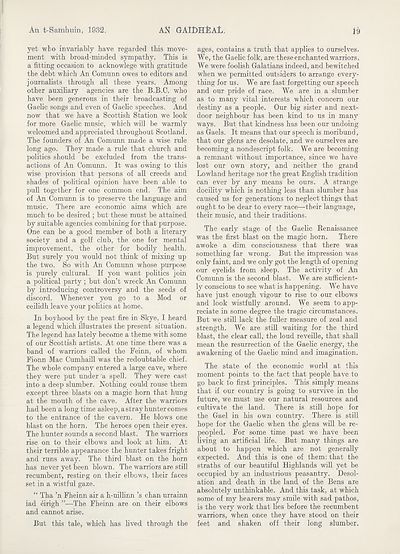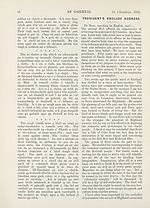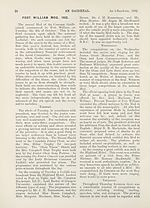An Comunn Gàidhealach Publications > Gaidheal > Volume 28, October 1932--September 1933
(31) Page 19
Download files
Complete book:
Individual page:
Thumbnail gallery: Grid view | List view

Ah t-Saihhuln, 1932.
AN GAlt)HfeAL.
19
yet wLo invariably have regarded this move¬
ment with broad-minded sympathy. This is
a fitting occasion to acknowlege with gratitude
the debt which An Comunn owes to editors and
journalists through all these years. Among
other auxihary agencies are the B.B.C. who
have been generous in their broadcasting of
Gaelic songs and even of Gaelic speeches. And
now that we have a Scottish Station we look
for more Gaelic music, which will be warmly
welcomed and appreciated throughout Scotland.
The founders of An Comunn made a wise rule
long ago. They made a rule that church and
politics should be excluded from the trans¬
actions of An Comunn. It was owing to this
wise provision that persons of all creeds and
shades of political opinion have been able to
pull together for one common end. The aim
of An Comunn is to preserve the language and
music. There are economic aims which are
much to be desired ; but these must be attained
by suitable agencies combining for that purpose.
One can be a good member of both a literary
society and a golf club, the one for mental
improvement, the other for bodily health.
But surely you would not think of mixing up
the two. So with An Comunn whose purpose
is purely cultural. If you want politics join
a political party; but don’t wreck An Comunn
by introducing controversy and the seeds of
discord. Whenever you go to a Mod or
ceilidh leave your politics at home.
In boyhood by the peat fire in Skye, I heard
a legend which illustrates the present situation.
The legend has lately become a theme with some
of our Scottish artists. At one time there was a
band of warriors called the Feinn, of whom
Fionn Mac Cumhaill was the redoubtable chief.
The whole company entered a large cave, where
they were put under a spell. They were cast
into a deep slumber. Nothing could rouse them
except three blasts on a magic horn that hung
at the mouth of the cave. After the warriors
had been a long time asleep, a stray hunter comes
to the entrance of the cavern. He blows one
blast on the horn. The heroes open their eyes.
The hunter sounds a second blast. The warriors
rise on to their elbows and look at him. At
their terrible appearance the hunter takes fright
and runs away. The third blast on the horn
has never yet been blown. The warriors are still
recumbent, resting on their elbows, their faces
set in a wistful gaze.
“ Tha ’n Fheinn air a h-uillinn’s chan urrainn
iad eirigh ”—The Fheinn are on their elbows
and cannot arise.
But this tale, which has lived through the
ages, contains a truth that applies to ourselves.
We, the Gaelic folk, are these enchanted warriors.
We were foolish Galatians indeed, and bewitched
when we permitted outsiders to arrange every¬
thing for us. We are fast forgetting our speech
and our pride of race. We are in a slumber
as to many vital interests which concern our
destiny as a people. Our big sister and next-
door neighbour has been kind to us in many
ways. But that kindness has been our undoing
as Gaels. It means that our speech is moribund,
that our glens are desolate, and we ourselves are
becoming a nondescript folk. We are becoming
a remnant without importance, since we have
lost our own story, and neither the grand
Lowland heritage nor the great English tradition
can ever by any means be ours. A strange
docility which is nothing less than slumber has
caused us for generations to neglect things that
ought to be dear to every race—their language,
their music, and their traditions.
The early stage of the Gaelic Renaissance
was the first blast on the magic horn. There
awoke a dim consciousness that there was
something far wrong. But the impression was
only faint, and we only got the length of opening
our eyelids from sleep. The activity of An
Comunn is the second blast. We are sufficient¬
ly conscious to see what is happening. We have
have just enough vigour to rise to our elbows
and look wistfully around. We seem to app¬
reciate in some degree the tragic circumstances.
But we still lack the fuller measure of zeal and
strength. We are still waiting for the third
blast, the clear call, the loud reveille, that shall
mean the resurrection of the Gaelic energy, the
awakening of the Gaelic mind and imagination.
The state of the economic world at this
moment points to the fact that people have to
go back to first principles. This simply means
that if our country is going to survive in the
future, we must use our natural resources and
cultivate the land. There is still hope for
the Gael in his own country. There is still
hope for the Gaelic when the glens will be re¬
peopled. For some time past we have been
living an artificial life. But many things are
about to happen which are not generally
expected. And this is one of them: that the
straths of our beautiful Highlands will yet be
occupied by an industrious peasantry. Desol¬
ation and death in the land of the Bens are
absolutely unthinkable. And this task, at which
some of my hearers may smile with sad pathos,
is the very work that lies before the recumbent
warriors, when once they have stood on their
feet and shaken off their long slumber.
AN GAlt)HfeAL.
19
yet wLo invariably have regarded this move¬
ment with broad-minded sympathy. This is
a fitting occasion to acknowlege with gratitude
the debt which An Comunn owes to editors and
journalists through all these years. Among
other auxihary agencies are the B.B.C. who
have been generous in their broadcasting of
Gaelic songs and even of Gaelic speeches. And
now that we have a Scottish Station we look
for more Gaelic music, which will be warmly
welcomed and appreciated throughout Scotland.
The founders of An Comunn made a wise rule
long ago. They made a rule that church and
politics should be excluded from the trans¬
actions of An Comunn. It was owing to this
wise provision that persons of all creeds and
shades of political opinion have been able to
pull together for one common end. The aim
of An Comunn is to preserve the language and
music. There are economic aims which are
much to be desired ; but these must be attained
by suitable agencies combining for that purpose.
One can be a good member of both a literary
society and a golf club, the one for mental
improvement, the other for bodily health.
But surely you would not think of mixing up
the two. So with An Comunn whose purpose
is purely cultural. If you want politics join
a political party; but don’t wreck An Comunn
by introducing controversy and the seeds of
discord. Whenever you go to a Mod or
ceilidh leave your politics at home.
In boyhood by the peat fire in Skye, I heard
a legend which illustrates the present situation.
The legend has lately become a theme with some
of our Scottish artists. At one time there was a
band of warriors called the Feinn, of whom
Fionn Mac Cumhaill was the redoubtable chief.
The whole company entered a large cave, where
they were put under a spell. They were cast
into a deep slumber. Nothing could rouse them
except three blasts on a magic horn that hung
at the mouth of the cave. After the warriors
had been a long time asleep, a stray hunter comes
to the entrance of the cavern. He blows one
blast on the horn. The heroes open their eyes.
The hunter sounds a second blast. The warriors
rise on to their elbows and look at him. At
their terrible appearance the hunter takes fright
and runs away. The third blast on the horn
has never yet been blown. The warriors are still
recumbent, resting on their elbows, their faces
set in a wistful gaze.
“ Tha ’n Fheinn air a h-uillinn’s chan urrainn
iad eirigh ”—The Fheinn are on their elbows
and cannot arise.
But this tale, which has lived through the
ages, contains a truth that applies to ourselves.
We, the Gaelic folk, are these enchanted warriors.
We were foolish Galatians indeed, and bewitched
when we permitted outsiders to arrange every¬
thing for us. We are fast forgetting our speech
and our pride of race. We are in a slumber
as to many vital interests which concern our
destiny as a people. Our big sister and next-
door neighbour has been kind to us in many
ways. But that kindness has been our undoing
as Gaels. It means that our speech is moribund,
that our glens are desolate, and we ourselves are
becoming a nondescript folk. We are becoming
a remnant without importance, since we have
lost our own story, and neither the grand
Lowland heritage nor the great English tradition
can ever by any means be ours. A strange
docility which is nothing less than slumber has
caused us for generations to neglect things that
ought to be dear to every race—their language,
their music, and their traditions.
The early stage of the Gaelic Renaissance
was the first blast on the magic horn. There
awoke a dim consciousness that there was
something far wrong. But the impression was
only faint, and we only got the length of opening
our eyelids from sleep. The activity of An
Comunn is the second blast. We are sufficient¬
ly conscious to see what is happening. We have
have just enough vigour to rise to our elbows
and look wistfully around. We seem to app¬
reciate in some degree the tragic circumstances.
But we still lack the fuller measure of zeal and
strength. We are still waiting for the third
blast, the clear call, the loud reveille, that shall
mean the resurrection of the Gaelic energy, the
awakening of the Gaelic mind and imagination.
The state of the economic world at this
moment points to the fact that people have to
go back to first principles. This simply means
that if our country is going to survive in the
future, we must use our natural resources and
cultivate the land. There is still hope for
the Gael in his own country. There is still
hope for the Gaelic when the glens will be re¬
peopled. For some time past we have been
living an artificial life. But many things are
about to happen which are not generally
expected. And this is one of them: that the
straths of our beautiful Highlands will yet be
occupied by an industrious peasantry. Desol¬
ation and death in the land of the Bens are
absolutely unthinkable. And this task, at which
some of my hearers may smile with sad pathos,
is the very work that lies before the recumbent
warriors, when once they have stood on their
feet and shaken off their long slumber.
Set display mode to:
![]() Universal Viewer |
Universal Viewer | ![]() Mirador |
Large image | Transcription
Mirador |
Large image | Transcription
| An Comunn Gàidhealach > An Comunn Gàidhealach Publications > Gaidheal > Volume 28, October 1932--September 1933 > (31) Page 19 |
|---|
| Permanent URL | https://digital.nls.uk/127131384 |
|---|
| Description | This contains items published by An Comunn, which are not specifically Mòd-related. It includes journals, annual reports and corporate documents, policy statements, educational resources and published plays and literature. It is arranged alphabetically by title. |
|---|
| Description | A collection of over 400 items published by An Comunn Gàidhealach, the organisation which promotes Gaelic language and culture and organises the Royal National Mòd. Dating from 1891 up to the present day, the collection includes journals and newspapers, annual reports, educational materials, national Mòd programmes, published Mòd literature and music. |
|---|---|
| Additional NLS resources: |
|

